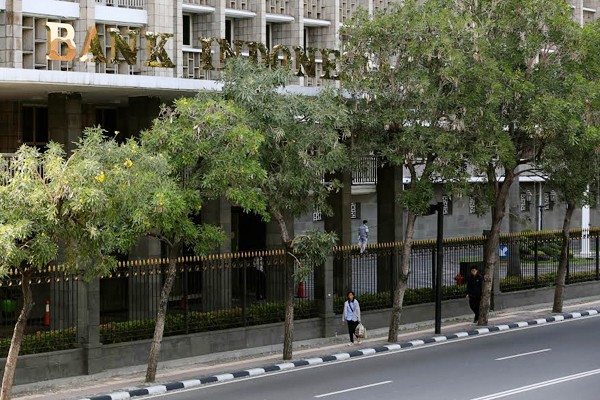Popular Reads
Top Results
Can't find what you're looking for?
View all search resultsPopular Reads
Top Results
Can't find what you're looking for?
View all search resultsKPK goes all in on BLBI case
KPK names former IBRA suspect in BLBI case Syafruddin accused of collusion with owner of bank.
Change text size
Gift Premium Articles
to Anyone
I
n early 2014, then Corruption Eradication Commission (KPK) chairman Abraham Samad initiated a probe into alleged irregularities surrounding the disbursement of Bank Indonesia liquidity support (BLBI). Later that year, Abraham indicated that the KPK would summon former president Megawati Soekarnoputri for the case.
Abraham was removed from his post in February 2015, following a standoff between the KPK and police, following the former’s decision to name Megawati’s former aide Insp. Gen. Budi Gunawan as a graft suspect. The case went nowhere after Abraham’s dismissal.
On Tuesday, the new leadership of the KPK pressed ahead with the probe by naming former chairman of the Indonesian Bank Restructuring Agency (IBRA) Syafruddin Arsyad Temenggung a suspect in the BLBI case. Syafruddin was chairman of the IBRA under Megawati’s administration.
Syafruddin is the first official to be named a suspect in the case after three years of investigation looking into past documents and questioning a number of former ministers in Megawati’s administration.
Syafruddin, who was appointed IBRA chairman in 2002, issued a letter for Sjamsul Nursalim, the owner of Bank Dagang Nasional Indonesia (BDNI), freeing him from the obligation to pay Rp 3.7 trillion in debt owed to the government, which disbursed the fund under the Bank Indonesia Liquidity Scheme (BLBI).
Syafruddin’s decision was based on a presidential decision issued by Megawati in December 2002, regulating the “release and discharge” letters, freeing recipients of the funds from the obligation to fully pay the debts.
Sjamsul’s BDNI received Rp 28 trillion of the BLBI fund and was obligated to return Rp 4.8 trillion, but Syafruddin decided that the bank should only pay Rp 1.1 trillion.
“The KPK has found two pieces of evidence and therefore moves to name Syafruddin a suspect in the case,” KPK deputy chairman Basaria Panjaitan told reporters.
(Read also: KPK asked to probe unresolved BLBI cases)
During the 1997-1998 Asian financial crisis, the government, through the central bank, provided liquidity support of Rp 144.5 trillion to assist 48 commercial banks in coping with massive runs during the monetary crisis, but 95 percent of the money was eventually embezzled.
The Attorney General’s Office (AGO) has launched a probe into Sjamsul for allegedly misusing the fund but decided to drop the case in 2008.
In 2014, the KPK decided to probe the issuance of a release and discharge letter for Sjamsul and found indications that the decision could have been the result of collusion between Sjamsul and Syafruddin.
There are a total of 21 debtors, including Sjamsul, who received the release and discharge recommendation from the IBRA.
According to data from Indonesia Corruption Watch (ICW), the 21 debtors include Hendra Liem of Budi International Bank, the Ning King of Dana Hutama Bank, Sudwikatmono of Bank Subentra and Bank Surya, Ibrahim Risjad of the Bank Risjad Salim International, Soedono Salim of Bank Central Asia (BCA), Siti Hardijanti Rukmana of Yakin Makmur Bank, Hashim Djojohadikusumo of Papan Sejahtera bank and Nirwan Bakrie of Nusa Nasional bank.
Sjamsul, who is also known as the owner of tire giant Gajah Tunggal and coal miner Bukit Baiduri Energi, is currently in Singapore and the KPK has urged Sjamsul to return to the country for a possible questioning.
When asked if KPK investigators would summon Megawati for questioning, Basaria declined to give a comment.
“The policy was not part of a corruption scandal because corruption happens only when those who issue the policy, or those close to them, benefit,” Basaria said.
On Friday, the KPK questioned Kwik Kian Gie, who was the finance minister between 1999 and 2000.
KPK spokesman Febri Diansyah said the KPK questioned several individuals as part of its effort to expand its investigation into the BLBI case, which was important to the public.
Indonesian Institute of Sciences (LIPI) political analyst Siti Zuhro said the decision to name a suspect in the BLBI case could be politically motivated as it was an old case, just like the electronic identity (e-ID) case, which involved officials and politicians from the era of former president Susilo Bambang Yudhoyono.
“Now the KPK has to prove they are neutral and show that as law enforcers they are non-partisan and independent,” she said.
Members of the House of Representatives Commission III of the Indonesian Democratic Party of Struggle (PDI-P) Trimedya Pandjaitan said that the party continued to believe in the independence of the antigraft body.
“We respect the legal process carried out by the KPK as long as it is conducted for law enforcement purposes,” he said.
“Release and discharge”
May 2002: Then chairman of Indonesian Bank Restructuring Agency (IBRA) Syafruddin Arsyad Temenggung proposes to KKSK (Financial System Stability Committee) to restructure debt owed by businessman Sjamsul Nursalim worth Rp 4.8 trillion.
▼December 2002: Then president Megawati Soekarnoputri issues a presidential decree (Inpres) that regulates the ‘release and discharge’ letters, freeing recipients of the funds from the obligation to fully pay the debts.
April 2004: Syafruddin gives the all clear to Sjamsul, relieving him of the obligation to pay his debt to IBRA.










